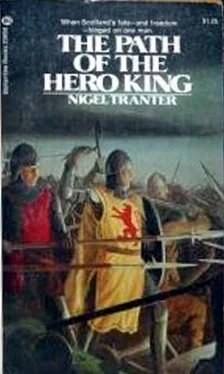But they were alive-and would not die of cold yet awhile. If a punitive force came this far, these would give it information-and send it after the perpetrators, hotfoot.
Bruces small host was now much split up and dispersed. Some few were up on the high ground again, watching, to signal any English approach. Some were no great distance up the riverside track to the loch, moving slowly, trailing their wings as it were, should there be any early pursuit, decoys. Boyd, with the main body of men-at-arms, held the mass of the prisoners up near Loch Troolhead. While the King himself, with the Islesmen, climbed a steep mountainside above the far, east side of the loch, with the first of the slanting April sunlight just beginning to blind them with its early dazzle.
This east side of upper Glen Trool was very different from the west. Where the other was thickly wooded and rose in great steps and terraces towards lesser heights first, and then to high frowning Merrick itself, on this side the land rose steep, stony and bare in an almost unbroken sweep to the towering summit of Muldonach, more than 1,500 feet higher than the loch. A single thread of narrow track crossed the face of this naked brae side rising and falling, now near the waters edge, now many scores of feet above it. This track, the only one to lead southwards on that side, Bruce and his party had left, to climb steeply upwards, panting breath clouds in the sharp morning air.
There was one sizeable break, or shelf, on the face of that long hill, a rough terrace about half a mile long some 300 feet above the water. This was their objective.
When they reached it, breathless, it was to find it deeper than the King had anticipated from a distance, more broken. But this was immaterial. It averaged perhaps 200 yards in width, was far from consistently flat, and was pitted with heather-grown hollows and aprons of trapped water and emerald-green moss. But mainly it was bare, backed by screes, and as well as surface-water it had trapped a great variety of stones and boulders, tumbled from higher. Bruce was well satisfied. The whole hillside was stony, of course; but this trap would save them much work and time. And from the low ground they could remain hidden save on the very lip of the shelf. And the view down the valley was not to be bettered, right down to the Cree, indeed across the Wigtown peninsula itself, to Luce Bay and the Solway.
He set his Highlanders to the collection, rolling and positioning of great stones and boulders, by the hundred.
With still no sign of movement from down the valley, and assured of progress here, leaving the Islesmen at work, and a lookout to signal any approach from the south, the King went longstrided downhill again, concerned to correctly position his few cavalry. In an operation of the scale he visualised, 200 was pitifully few. And a percentage of that had to be left to guard and accompany the prisoners.
He gave the impatient Edward the command of seventy-five, and sent them off along the narrow track above the loch shore to the farthest-away position about a mile to the southeast, where a fair-sized stream coming down the mountain had carved a deep, steep ravine, which must serve to give them cover. At all costs they must remain hidden therein until signalled, especially from across the loch. Campbell was to take another seventy-five up the right hand of me two narrowing glens into which the main valley split at the head of the loch, to hide around the first bend. Boyd and Fleming would retain approximately fifty mounted men, with the prisoners, waiting by the shore at the start of the east track, ready to show themselves and to move off south by east. Bruce detailed the signals, for each group, stressing the need for the most exact timing. More he could not do. Taking Hay for lieutenant, he set off once again to climb the hill to his Islesmen.
So commenced the trying, testing waiting, the enforced idleness.
It was well enough for the men; they were all weary with the nights exertions and lack of sleep-though most of the Islesmen continued to add to their vast supply of boulders and rocks, now marshalled for a quarter-mile along the lip of the shelf. But Bruce himself could not rest, even though lookouts were posted to give ample warning of eventualities. He sat there in the heather, staring down the long fair valley, flooded now with sunlight, while the larks shouted above him, straining tired eyes for the first hint of movement, glint of steel.
An hour he sat, fretting, and half another, a prey to fears that he had
misjudged, that Pembroke was not to be lured, provoked, coaxed. That,
or else he was coming in great force, and taking an unconscionable time
to effect it. It was neither movement nor the gleam of armour which
brought an end to his fretting, but a thin column of smoke rising above and behind the ridge of High Minniwick, almost three miles to the south, where he had posted a picket. That meant that the English were indeed coming, and were visible from there at least.
There was no need to strain the eyes, presently. Like a dark river alongside the silvery one, but flowing the wrong way, a dense column of men began to appear from round one of the far bends of the lower valley. It could not be a broad column, because of the constriction of the terrain; but that it was long became ever more evident. On and on came the ranks, emerging into view, seeming endless, too far away as yet for details, but by the pace, all mounted.
There were brief breaks in the purposeful procession, but only between divisions and cohorts. New sections followed on monotonously.
It is an army! Hay cried.
He has sent a host, no mere striking force. I have counted twelve already-twelve divisions. And still they come. We cannot challenge such numbers, Sire!
The King said nothing.
At last there seemed to be an end. At a conservative estimate that column was well over a mile long. Before the tail was much past the confluence of Minnoch and Trool, the head was reaching the foot of the loch.
Fifteen, I counted, Hay declared.
What can we do, Sire?
Fifteen divisions of the best soldiers in Christiandom. And we have
300. Mosstroopers and cater ans
We fight on our chosen field, Bruce pointed out.
That means much. Besides, what means fifteen divisions? Are they in scores or hundreds or five-hundreds, How many abreast do they ride? They can scarce ride more than three on that ground. Three files of three, mounted, would take up a dozen yards and more. That is … let me count it … say, 1,200 to a mile, no more. None so vast a host.
It was Hays turn to remain silent, however eloquent he looked.
Loch Trool was more than two miles long but less than a quarter of that in width. By the time that the head of the English column was halfway up the west side, Bruce, from his elevation, could distinguish considerable detail, not much more than a mile away across the water. He reckoned that they did indeed ride in threes, a goodly array in the forenoon sun, standards, banners, pennons flying, the steam of horses, and everywhere the gleam of armour.
I cannot think that there are more than a hundred to each division, Gibbie, be decided.
Fifteen hundred in all, perhaps…
Five times our cumbers!
Aye-but in bad country for cavalry. The standards at their head-can you make them out? The colours? The Leopards of England fly at this side, yes-but what of the other? Beyond. Not the azure and gules of Pembroke, I think.
It is cheque red is it not? Blue and gold?
The azure and, or, cheeky, of Clifford of Brougham! By the Rude, he has sent Clifford! Bruces eyes had narrowed, in more than the glare of slanting sunlight.
Clifford, of all men, I would bring low! Once I challenged Robert Clifford to personal combat.
Читать дальше












